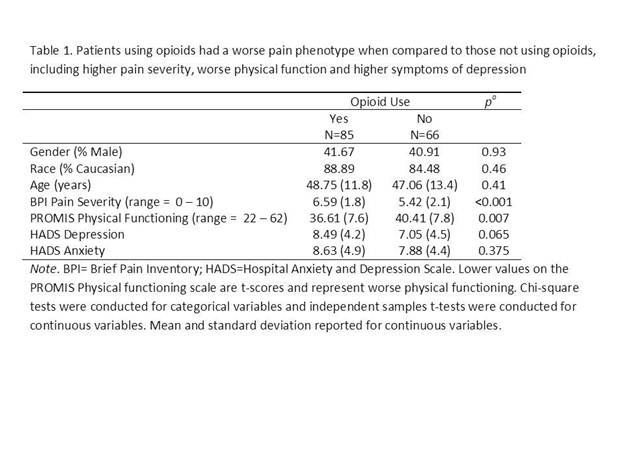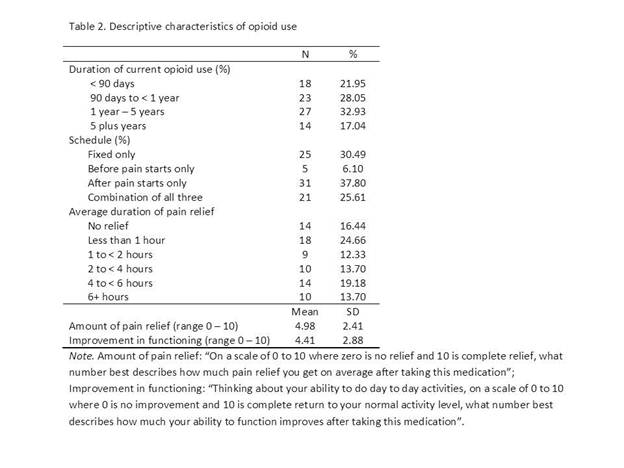Session Information
Session Type: ACR Poster Session B
Session Time: 9:00AM-11:00AM
Opioids remain the cornerstone of acute pain therapy. However,
there is little empirical evidence supporting the use of long-term opioid
therapy for chronic pain. In clinic settings, one of the challenges faced by
physicians is determining what to do with patients who were started on opioids
for therapeutic use (i.e. pain relief) but who continue to use opioids even
when benefit is not apparent. The goal of this study was to describe the unique
characteristics of patients currently taking opioids. Methods:
This study included 150 new patients between the ages 18-70
seeking treatment for chronic pain at an outpatient tertiary pain clinic. As
part of their visit, all patients completed self-report measures of pain
severity (Brief Pain Inventory), physical functioning (PROMIS Short Form) and
psychiatric symptoms (Hospital and Depression Scale). During the new patient
visit, a research assistant approached eligible patients in an exam room and
completed a structured interview developed by the investigative team. For patients reporting current opioid use,
additional data was collected including duration of use, helpfulness of opioid
across multiple domains, motivation to continue opioids, and interest in
learning alternative ways to manage pain. The Opioids Difficulties Scale (PODS)
and Domains of Change Opioid Scale (DCOS) were collected on all participants
currently taking opioids. Chi-square and t-tests were conducted. Results:
Of the 150 patients, 55.26% (N=84) reported current opioid
use. Current opioid use was associated with a worse clinical phenotype,
including higher pain severity, worse physical functioning, and more symptoms
of depression (See Table 1). Descriptive data on the characteristics of opioid
use is presented in Table 2 and opioid related beliefs are presented in Table
3. Conclusion:
These data question the benefits of long term opioid use.
For instance, 41% of patients report less than an hour of pain relief after
taking an opioid. The data from this study also highlight important target
areas for helping patients not benefiting from opioids taper off opioids. For
instance, patients report low confidence in their ability to manage pain
without opioids. Importantly, the majority of patients report interest in
learning alternative strategies for managing their pain.
To cite this abstract in AMA style:
Goesling J, Moser S, Hassett AL, Brummett C, Gulau N. Descriptive Characteristics of Patients Prescribed Opioids for the Treatment of Chronic Pain [abstract]. Arthritis Rheumatol. 2015; 67 (suppl 10). https://acrabstracts.org/abstract/descriptive-characteristics-of-patients-prescribed-opioids-for-the-treatment-of-chronic-pain/. Accessed .« Back to 2015 ACR/ARHP Annual Meeting
ACR Meeting Abstracts - https://acrabstracts.org/abstract/descriptive-characteristics-of-patients-prescribed-opioids-for-the-treatment-of-chronic-pain/



